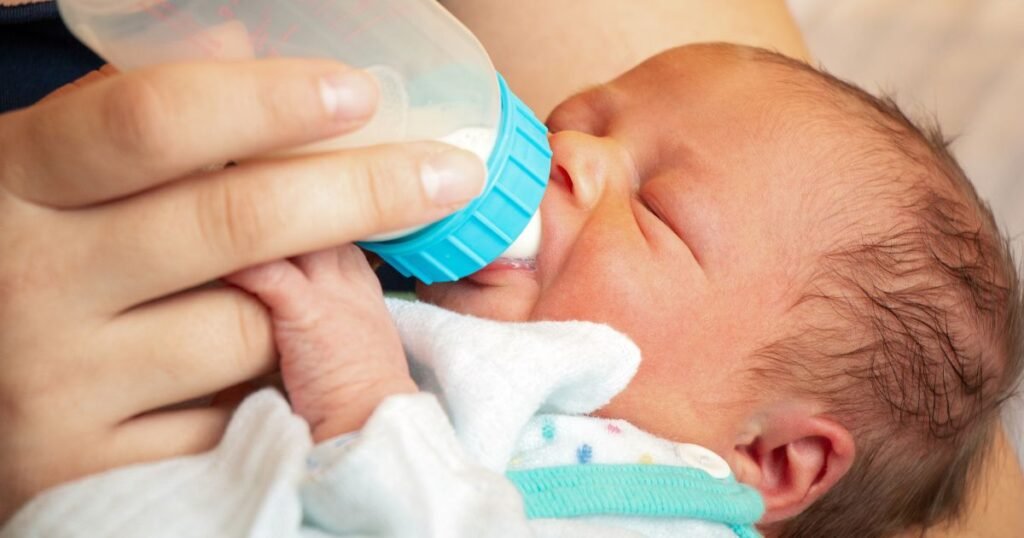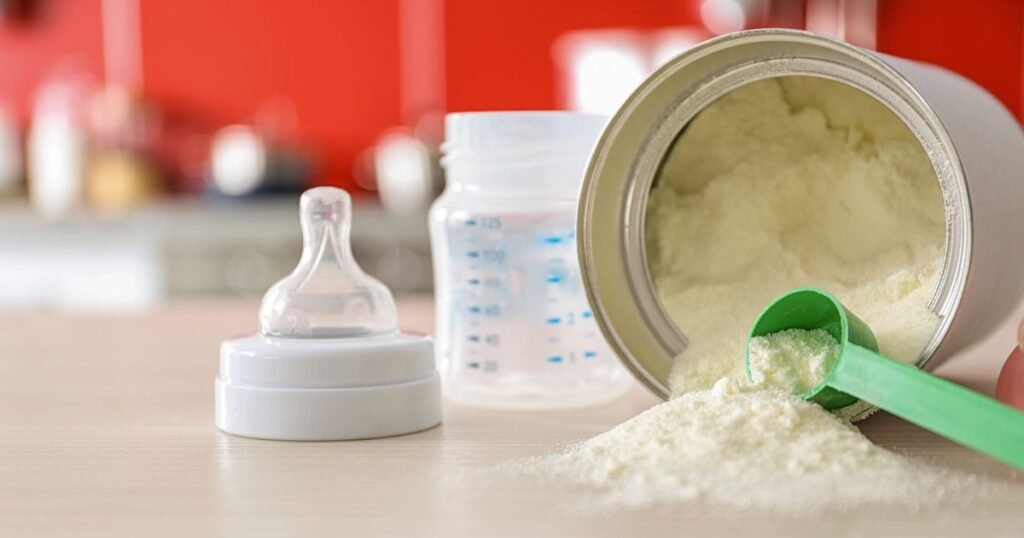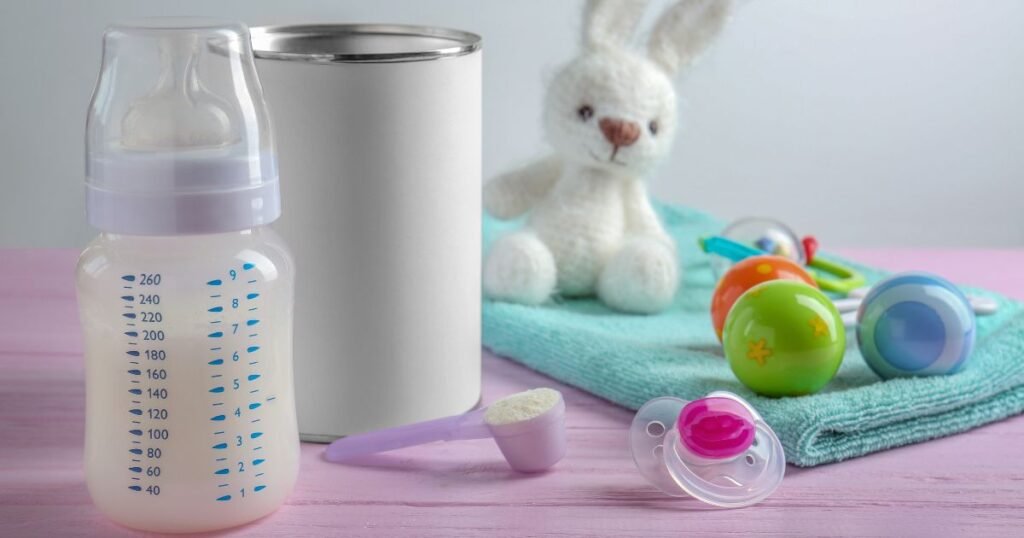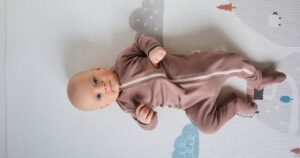Last Updated on 14 March 2024
As a pediatrician, one of the questions I frequently encounter from new parents is, “Can newborns drink cold formula? The answer is yes. However, certain conditions need to be met before your newborn can drink cold baby formula. For this reason, we will delve into the nuances of formula temperature and provide you with the facts you need to make an informed decision.
Debunking Myths: Cold Formula Facts
Baby formula nutrition is designed to provide essential nutrients for a baby’s growth and development. It typically contains a balance of carbohydrates, proteins, fats, vitamins, and minerals. The temperature of the formula can affect the overall experience of feeding for both the baby and the caregiver. Warm formula is preferred by babies because it mimics the temperature of breast milk.
On the other hand, cold formula can be a convenient option for parents, as it eliminates the need for heating and allows for quick and easy feeding. It is important that the temperature of the formula is safe for the baby to consume and should not be too hot or too cold. The ideal temperature for serving formula is generally around room temperature.
There are some common myths and misconceptions surrounding cold baby formulas. One myth is that cold formula can cause digestive issues in babies. However, there is no scientific evidence to support this claim. Another myth is that cold formula is not as nutritious as warm formula. In reality, the nutritional content of the formula is not affected by its temperature. It is important to separate fact from fiction when it comes to feeding your baby cold formula.
Another misconception is that cold formula can cause hot spots that could potentially burn a baby’s mouth. However, hot spots can occur in formula at any temperature if they are not properly mixed. It is important to thoroughly mix the formula to ensure an even temperature throughout the bottle. There is also a myth that warm water is required to mix the formula. While warm water is often recommended, it is not necessary as long as the water is safe.
Is Cold Baby Formula Safe for Newborns?
According to the American Academy of Pediatrics (AAP), serving cold formula to newborns is safe as long as it is prepared and stored properly. Here are some key points to consider:

- The AAP does not explicitly state that infant formula should be warmed before feeding. The decision to serve cold or warm formula is generally up to the parent’s preference and the baby’s acceptance.
- A cold formula does not pose any immediate health risks to newborns.
- Proper storage guidelines for formula are essential to ensure its safety and quality. The formula should be stored in a clean, airtight container and refrigerated according to the manufacturer’s instructions.
- Newborns have a weakened immune system, so it is crucial to prioritize hygiene and cleanliness when preparing and handling formula.
- Always consult with your pediatrician for personalized advice on feeding and formula temperature.
Advantages of Offering Cold Formula
Serving cold baby formula can offer several advantages for both parents and babies. Here are some benefits:
- Room temperature: Cold formula is often served at room temperature, eliminating the need for heating and allowing for quick and easy feeding.
- Cold bottle: Some babies may find comfort in the coolness of a cold bottle, especially during teething or on hot days.
- First step: Introducing a cold formula can be the first step in transitioning your baby to self-feeding and independence.
- Convenient option: Cold formula can be convenient for parents, especially on the go or during nighttime feedings.
Potential Concerns with Cold Formula
While cold formula is generally safe for newborns, there are a few potential concerns to be aware of:
- Digestive system: Some babies may have a sensitive digestive system and experience discomfort or gas when consuming cold formula. It’s essential to monitor your baby’s response and consult with their pediatrician if you have any concerns.
- Potential risks: Improperly stored or prepared cold formula can pose a risk of bacterial contamination. Proper storage and handling guidelines are essential to ensure the formula’s safety.
- Cold bottle of milk: Babies who are used to warm or room-temperature milk may initially reject cold formula. Transitioning them to a cold formula may take time and consistency.
Health Benefits According to Experts
Experts agree that cold formula can provide the essential nutrients needed for a baby’s growth and development. The temperature of the formula does not affect its nutritional content. The cold baby formula offers the following benefits:

- Essential nutrients: Cold formula contains a balanced mix of carbohydrates, proteins, fats, vitamins, and minerals, which are crucial for a baby’s overall health.
- Suitable for the body temperature: Cold formula is served at room temperature, similar to a baby’s body temperature. This can provide a more comfortable feeding experience for the baby.
- Convenience: Cold formula can be quickly and efficiently served, making it a convenient option for parents, especially during travel or busy schedules.
Recommendations for Feeding Newborns
Feeding newborns requires careful consideration, and the temperature of the formula is no exception. Here are some recommendations for feeding newborns:
- Premature babies: Premature babies may have different nutritional needs and benefit from slightly warm formula. Consult with your baby’s pediatrician for specific recommendations.
- Bowl of warm water: To warm a bottle of cold formula, place it in a bowl of warm water for a few minutes until it reaches the desired temperature. Always test the temperature on your wrist before feeding the baby.
- Bottle warmers: Bottle warmers are designed to heat bottles to the desired temperature safely. Follow the manufacturer’s instructions for proper use, and never leave a bottle unattended in a bottle warmer.
Practical Tips for Cold Baby Formula Feeding
When it comes to feeding your baby cold formula, it’s important to follow proper storage and handling practices. Here are some practical tips to keep in mind:
- Proper storage: Store formula in a clean, airtight container in a cool, dry place according to the manufacturer’s instructions.
- Unused formula: Discard any formula that has been left at room temperature for more than 2 hours to ensure the safety of the baby.
- Hygiene: Wash your hands thoroughly before preparing formula and clean bottles and nipples properly to prevent bacterial contamination.
Preparing Cold Formula for Your Baby
Preparing cold formula for your baby is a simple process. Here’s how to do it:
- Start with cold milk: Start with milk that is already cold. If you have prepared formula in advance and stored it in the refrigerator, you can use that.
- Add water: Use cold water at room temperature to mix with the formula powder. Follow the manufacturer’s instructions for the correct ratio of water to formula.
- Mix thoroughly: Shake or stir the bottle vigorously to ensure that the formula is well-mixed and there are no clumps.
- Check the temperature: Before feeding your baby, test the temperature of the formula by placing a few drops on the inside of your wrist. It should feel neither hot nor cold but close to body temperature.
Best Practices for Storage and Safety
Proper storage and safety practices are crucial when it comes to feeding your baby cold formula. Here are some best practices to follow:
- Airtight container: Store formula in a clean, airtight container to prevent bacterial contamination and maintain the quality of the formula.
- Proper storage: Follow the manufacturer’s instructions for storing formula, including refrigeration and shelf life guidelines.
- Unused formula: Discard any formula that has been left at room temperature for more than 2 hours to avoid the risk of bacterial growth.
- Hygiene: Wash your hands thoroughly before preparing formula and clean bottles and nipples properly to prevent contamination.
Warm vs. Cold Formula: Making the Choice
When it comes to choosing between warm and cold formula, it ultimately comes down to personal preference. Some babies may prefer the warmth of a bottle, while others may not mind the temperature of cold formula. It is important to consider your baby’s comfort and feeding preferences when making the choice.
The preferred formula temperature may vary depending on the situation. Here are some examples:
- Some parents prefer to serve warm formulas for nighttime feedings to help soothe and relax the baby.
- Babies may find comfort in drinking formula closer to their body temperature, as it mimics the breastfeeding experience.
- Some babies may prefer warm milk, similar to the temperature of breast milk. This can be a soothing and comforting experience for them.
The question of whether a newborn can drink cold formula depends largely on the baby’s individual preferences and comfort. While many newborns may prefer their formula at room temperature or slightly warmed to mimic the experience of breastfeeding, feeding them cold formula is generally safe as long as it has been properly prepared and stored. It is essential for parents to prioritize their baby’s comfort and well-being while remaining attentive to any signs of discomfort or digestive issues. Ultimately, consulting with a pediatrician can provide personalized guidance and reassurance regarding feeding practices for newborns. With proper care and attention, parents can confidently navigate their baby’s feeding journey, ensuring their little one is happy, healthy, and well-nourished.
Frequently Asked Questions
AUTHOR BIOGRAPHY









